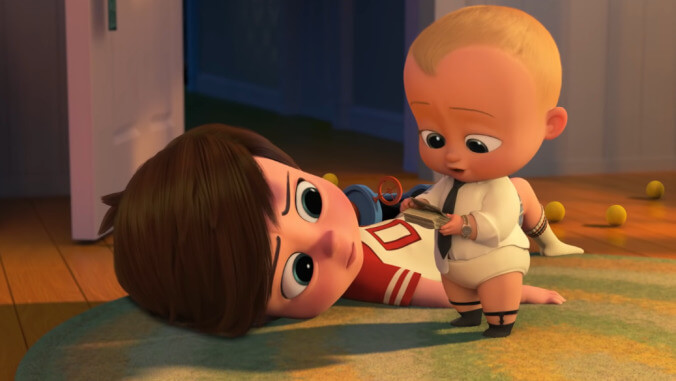The Boss Baby is now the subject of a philosophy symposium
Two Ph.D. students will hold the First Annual Boss Baby Symposium next January

Immanuel Kant. Jean Baudrillard. Boss Baby. Three names that burn bright in the cosmos of philosophical thought. Obviously, there is a “one of these things isn’t like the others” game going on. Conventional thinking tells us that the 2017 computer-generated animated comedy starring Alec Baldwin as an enterprising infant aiming for a corner office at Baby Corp might not be worth a second look. However, two Ph.D. students think otherwise. Jamie McCaffery of the University of Kentucky and Tore Levander of Fordham University happened upon The Boss Baby a few years ago, and its tiny baby hands, with that weird baby-grabbing strength, left an indelible mark. Now, they’re hosting a whole conference devoted to unpacking the mixed messages of a movie that posits that dog ownership is inherently threatening to the family unit.
As posted on the philosophy event site, PhilEvents, “The First Annual Boss Baby Symposium seeks to bring philosophical and interdisciplinary voices into dialogue about the enigmatic 2017 film The Boss Baby.” The listing continues:
This conference, the first of its kind, represents a rigorous attempt to respond to the question: “why are we so fascinated by this film?” We rise to the unlikely interpretive challenge posed by The Boss Baby with the academic rigor and precision expected of a conference, but welcome voices from all academic backgrounds.
This all leads to the question on everyone’s mind. Why The Boss Baby? It’s the hodgepodge of styles, themes, and messages that seemingly work against each other that’s made the film an obsession for McCaffery. “I really love interpretative nightmares and I think that Boss Baby is so in conflict with itself,” McCaffrey tells The A.V. Club. “Its messaging, the way that it tries to convey ideas, you almost can’t discern what the position of the movie is. And all the artistic decisions in the movie seem to be conflict with each other in such a way that as a viewer you are like ‘I don’t know what I’m supposed to feel and therefore I must analyze.’”
In a world of Space Jam: A New Legacys, The Boss Baby has remained strangely relevant, spawning a sequel, a TV show, and countless memes. Though still in the early stages of its ascent to the meme canonization, the film has similar qualities as other DreamWorks animated productions Shrek or Bee Movie. The reaction and enthusiasm surrounding those movies seemingly inspired the symposium. “The whole the story of “Shrek Retold” and Shrekfest,” said McCaffery, “This unironic love for a movie that was generated by people who saw beauty in it and came together, like ‘let’s just appreciate this thing and make it a real positive space of encouragement and fun.’” Still, The Boss Baby offers something intangible, a “strange magnetism,” as McCaffery puts it.
“It is not an artful masterpiece,” Levander tells The A.V. Club, “But it contains within it so many weird things that are so worthy of analysis. There’s definitely some classic Marxist analysis that you could put it into looking at the whole process of Baby Corp that is tied to natality in a super direct way. That’s really weird. And then the opposing corporation of Puppy Corp that wants to seemingly eradicate the need to ever reproduce. So there’s definitely feminist analysis that you could be putting on to Boss Baby. It goes on and on from the way that you want to end up approaching it.”
Boss Baby opens itself widely to interpretation. That’s partly a result of the messy filmmaking that nevertheless makes it such a joy to unpack. “There are countless themes that are gestalt like,” says McCaffery. “From a phenomenological perspective, the way the shots in the movie effect the viewer, it’s surreal. We can’t tell what’s happening in the movie is part of Tim’s imagination or if it’s actually going on. There’s a Kantian relational ethics field that could have a lot of fun with Boss Baby. Ethics and obligations to our family members.”
Despite the listing saying that the event would be held in Las Vegas—an in-joke for those Boss Baby real ones—the symposium will take place virtually. While both understand why some assume this is a joke, they hope to attract people with unique ideas about the movie. Listing the conference on PhilEvents, the pair hope to attract people looking to put some serious thought into The Boss Baby and its sequel Boss Baby: Family Business, which presents “even more interpretive nightmares than the first.”
Of course, most reading this probably think this is a joke, hoax, prank, or another meme. It’s not. This is actually happening. Levander and McCaffery are aware of the response to a Boss Baby Symposium but argue that simply because a movie isn’t high art doesn’t mean it’s not worthy of study. “Something that’s worthy of analysis is not saying that it is in and of itself a good representation of a piece of art or piece of film,” says Levander. “Our jobs as philosophers has nothing to do with the piece of art or that are upheld as better or that we think are better. It’s valid because it has this direct impact on society, or it’s telling society something about itself, or it’s a product of society, or it’s a product of pop culture.”
They have a point. The first Boss Baby film made more than $500 million worldwide, and even with it being made available on Peacock, the sequel cracked $100 million during a pandemic. Shouldn’t there be some understanding of the worldview this movie is trying to convey? “The kind of average movie that people don’t think about represents the things that we consume the most,” says McCaffery. “Why would we not want to sit down and have a meaningful discussion about these things?”